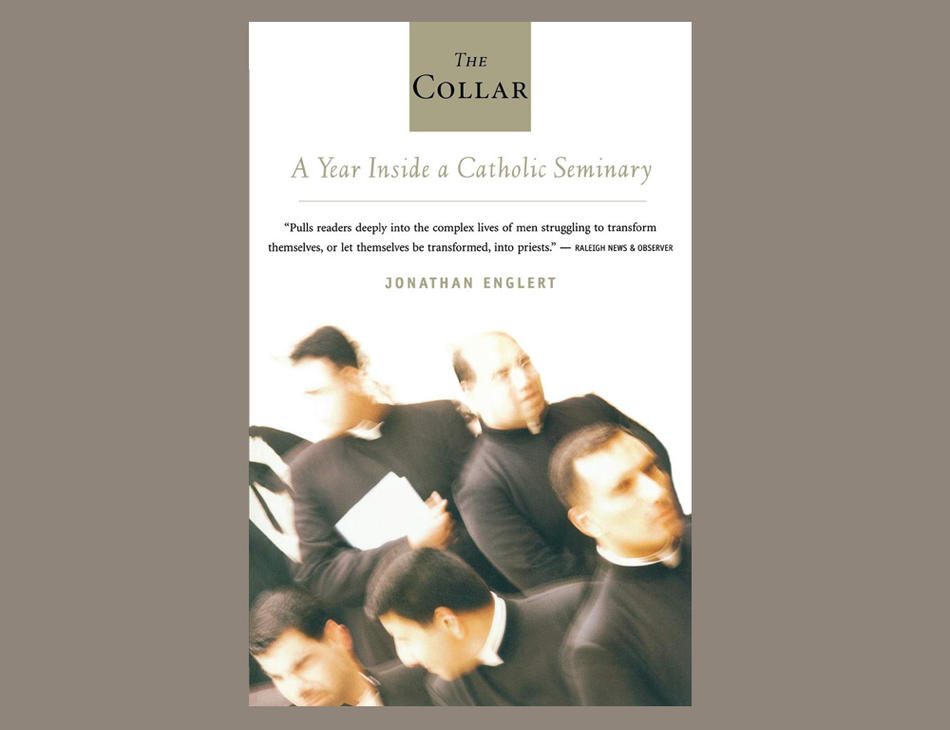My impressions of Catholic religious formation — the process of becoming a priest or a nun — have been shaped by some rather bleak sources. I think of Karen Armstrong's Through the Narrow Gate and Paul Hendrickson's Seminary. You read such books wanting to cry out, "Escape! Escape while you can!"
But here in The Collar, Jonathan Englert '01JRN brings us a whole different account of religious formation, a book about the making of Catholic priests in the 21st century.
You've come a long way, Father.
Englert, a writer and documentarian, spent a year at Sacred Heart Seminary in Milwaukee, a school that specializes in older men, some of whom had been married, who are preparing for the priesthood. Many do escape before taking their final vows, but I actually found myself hoping that some of them would make it to the finish line.
The abuse that went on in the seminaries of yore is largely gone. Seminarians of a generation ago were told to suppress their bodily and emotional urges and to submit to authority, however arbitrary. Suffering was often the path to a spiritual goal.
Much has changed. Seminarians today are not only allowed but encouraged to ask tough questions and to challenge their superiors. One of my favorite stories retold here is about the rector of a seminary who chastises one seminarian for wearing his hair long. "But Jesus had long hair," the seminarian says in protest. The rector is not to be outdone. He takes the seminarian out to the local swimming pool. "Now walk on that!" he commands.
That story is apocryphal, but some of the real-life incidents that Englert shares about Sacred Heart seem almost as uncanny. This is a book that is full of surprises.
For example, one might not expect to find reverence for Judaism in a Catholic seminary, but it is here in abundance. In fact, the seminary teacher of Jewish studies, a non-Jew named Dr. Lux, dons a yarmulke before reading Hebrew texts. He even compares papal encyclicals to sections of the Torah. Both, he notes, are known by their first word or words.
Then there is the seminarian who talks each night to his girlfriend by phone. (Perhaps not surprisingly, he eventually leaves and marries her. The celibate life, he decides, is not for him.)
The discussion of sex and celibacy is a theme of seminary life. "Celibacy had gone from being accepted but not discussed to being openly questioned and challenged by both clergy and laity," Englert writes. He takes us into Father McLernon's sexuality class where the priest — brace yourself — writes the following words on the board: vagina, penis, and rectum. He then leaves the room and asks the men to discuss what these words mean to them.
He returns a short while later and talks about the importance of confronting one's sexual feelings. "It's not about denying our sexuality," he tells the men. "It's about harnessing it."
The discussion seems to be particularly important because during Englert's year at the seminary, 2002-03, the Boston Globe broke the story of the long-simmering scandal of the Archdiocese of Boston, where the hierarchy looked the other way as priests who molested children were reassigned without punishment and without warning to parishioners.
The need for a new type of Catholic clergy has never been greater. Englert suggests that the seminarians of Sacred Heart, all of them sexually experienced and many of whom were once married, could be the future of the Catholic clergy. They are mature, motivated, and entering religious life with their eyes open.
Englert is on to something. While he found a seminary that caters exclusively to these "second career" types, he would find many of the same profile in seminaries throughout the country. Very few young men are entering anymore. The future is, indeed, with an older clergy.
Englert, however, is not one of these. His year at the seminary seems to have been a journalistic exercise. He is a convert to Roman Catholicism, we learn from his bio, and lives with his wife in New York City. The one thing missing from his excellent book is how the experience changed him. He tells us in his introduction that he was moved to investigate priestly formation after a "profound conversion experience in my own life," but then leaves himself out of the rest of the story. As someone who, like Englert, has spent time in a seminary, I know that even if you don't sign up for the life, you come away changed. Englert never tells us how. That's one piece of the story I would have liked to read.



